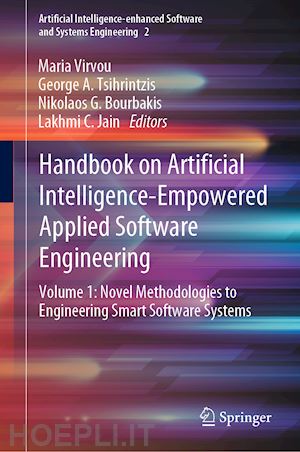
Questo prodotto usufruisce delle SPEDIZIONI GRATIS
selezionando l'opzione Corriere Veloce in fase di ordine.
Pagabile anche con Carta della cultura giovani e del merito, 18App Bonus Cultura e Carta del Docente
This book provides a structured overview of artificial intelligence-empowered applied software engineering. Evolving technological advancements in big data, smartphone and mobile software applications, the Internet of Things and a vast range of application areas in all sorts of human activities and professions lead current research towards the efficient incorporation of artificial intelligence enhancements into software and the empowerment of software with artificial intelligence.
This book at hand, devoted to Novel Methodologies to Engineering Smart Software Systems Novel Methodologies to Engineering Smart Software Systems, constitutes the first volume of a two-volume Handbook on Artificial Intelligence-empowered Applied Software Engineering. Topics include very significant advances in (i) Artificial Intelligence-Assisted Software Development and (ii) Software Engineering Tools to develop Artificial Intelligence Applications, as well as a detailed Survey of Recent Relevant Literature.
Professors, researchers, scientists, engineers and students in artificial intelligence, software engineering and computer science-related disciplines are expected to benefit from it, along with interested readers from other disciplines.
Maria Virvou, (B.Sc. Degree in Mathematics, National and Kapodistrian University of Athens, Greece; M.Sc. Degree in Computer Science, University College London (UCL), U.K.; Ph.D. Degree in Computer Science and Artificial Intelligence, University of Sussex, U.K.), is Full Professor, Head of the Department, Director of Post-Graduate Studies and Director of the Software Engineering Lab in the Department of Informatics, University of Piraeus, Greece. Her current research interests are in educational software, software engineering and mobile software, human–computer interaction, software personalization technologies, user modeling, and adaptive tutoring systems. She has (co-)authored over 350 research papers published in international journals, books and conference proceedings and 7 books and monographs in computer science. She has received several best paper awards and has been an invited keynote speaker in several international conferences. She ranks in the top 2% of the most influential scientists worldwide in the area of artificial intelligence, according to Ioannidis, J. P., Boyack, K. W., & Baas, J. (2020) "Updated science-wide author databases of standardized citation indicators", PLoS Biology, 18(10), e3000918.
George A. Tsihrintzis, (Diploma of Electrical Engineer, National Technical University of Athens, Greece (with honours); M.Sc. and Ph.D. degrees in Electrical Engineering, Northeastern University, Boston, Massachusetts, USA), is Full Professor in the Department of Informatics, University of Piraeus, Greece, and served as its Head from Sept. 2016 through Aug. 2020. During 2012–2016, he served as Member of the Council of the University of Piraeus, a body of experts supervising and advising the University of Piraeus at the highest managerial level. From 2008 to date, he is also serving as Director of the Graduate Program of Study in “Advanced Computing and Informatics Systems” of the Department. His current research interests include pattern recognition, machine learning, decision theory, and statistical signal processing and their applications in multimedia interactive services, user modeling, knowledge-based software systems, human–computer interaction and information retrieval. He has (co-)authored over 350 research publications in these areas, including 5 monographs and 30 edited volumes.
Nikolaos G. Bourbakis, (B.S. in Mathematics, National and Kapodistrian University of Athens, Greece; Certificate in Electrical Engineering, University of Patras, Greece; Ph.D. in Computer Engineering and Informatics, University of Patras, Greece; IEEE Fellow-1996), is currently Distinguished Professor of Information and Technology and Director of the Center of Assistive Research Technologies (CART) at Wright State University, Ohio, USA. He is the founder and Editor-in-Chief of the International Journal on AI Tools, the International Journal on Monitoring and Surveillance Tech Research and the EAI Transactions on Bioengineering & Bioinformatics and Founder and General Chair of several International IEEE Computer Society Conferences (ICTAI, ICBIBE, IISA), as well as various Symposia and Workshops. He pursues research in assistive technologies, applied artificial intelligence, bioengineering, information security, and parallel/distributed processing funded by USA and European governments and industry. His research work has been internationally recognized, and he has received several prestigious awards.
Lakmhi C. Jain, Ph.D., M.E., B.E. (Hons.), Fellow (Engineers Australia), is with KES International Shoreham-By-Sea, UK, which he founded as an international forum for providing professional communities the opportunity for publications, knowledge exchange, cooperation and teaming. Involving around 5,000 researchers drawn from universities and companies worldwide, KES facilitates international cooperation and generates synergy in teaching and research. KES regularly provides networking opportunities for professional communities through one of the largest conferences of its kind in the area of KES. He is a world-recognized researcher with significant contributions in various fields of artificial and computational intelligence, including the (co-)authorship and (co-)editorship of over 400 monographs, edited volumes and conference proceedings.











Il sito utilizza cookie ed altri strumenti di tracciamento che raccolgono informazioni dal dispositivo dell’utente. Oltre ai cookie tecnici ed analitici aggregati, strettamente necessari per il funzionamento di questo sito web, previo consenso dell’utente possono essere installati cookie di profilazione e marketing e cookie dei social media. Cliccando su “Accetto tutti i cookie” saranno attivate tutte le categorie di cookie. Per accettare solo deterninate categorie di cookie, cliccare invece su “Impostazioni cookie”. Chiudendo il banner o continuando a navigare saranno installati solo cookie tecnici. Per maggiori dettagli, consultare la Cookie Policy.